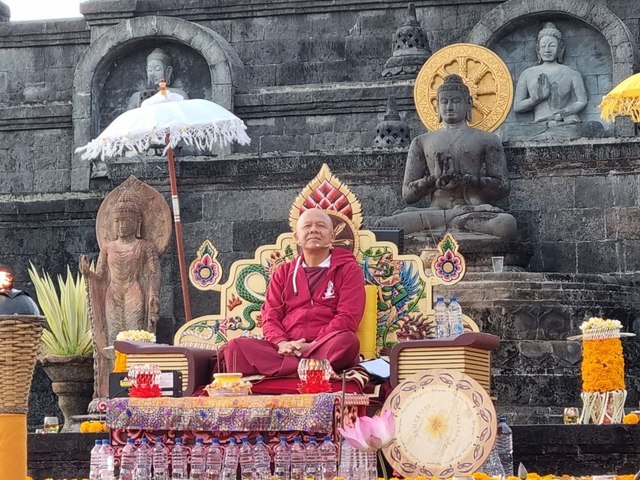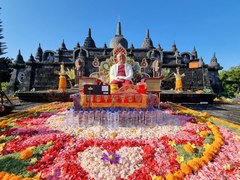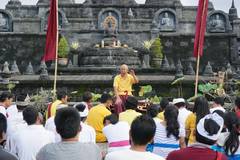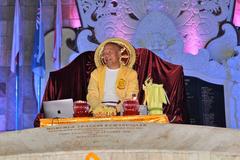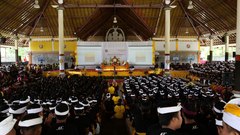Bali: Where Mother Earth Rewrites Human History…
October 09, 2025 (PRLEAP.COM) Entertainment News
North Bali, Indonesia - Two decades after tragedy struck Bali, the island has emerged as a global symbol of healing and peace. While the early 2000s brought terror to both the United States and Bali, the two places chose very different paths. Bali's response - rooted in compassion and spiritual resilience - has turned a wound into a model of hope for a world still struggling with violence.Two Similar Attacks, Two Different Futures
On 11 September 2001, the United States suffered the deadliest terrorist attack in its history. Just over a year later, on 12 October 2002, bombs exploded in Bali, killing 202 people and injuring hundreds. The dates - 11-9-2001 and 12-10-2002 - move forward by one, a pattern many have interpreted as a symbolic message of oneness: humanity shares one fate.
Yet the aftermaths could not have been more different.
In the United States, grief was followed by wars in Afghanistan and Iraq. Global headlines became dominated by invasions, fear, and political division. Saddam Hussein was captured and executed.
In Bali, there was no revenge. Instead, the Balinese - Hindus, Muslims, Christians, Buddhists - united to mourn and rebuild. Interfaith bonds grew stronger. Temples, mosques, and churches became spaces of prayer and consolation rather than division.
This quiet, non-violent reaction drew little immediate attention, yet over time it has reshaped Bali's identity on the global stage.
From Pain to a Global Image of Peace
In the years that followed, the United States remained entangled in cycles of war and security crises. Bali took another path: it became known internationally as a sanctuary of love and spiritual renewal.
Elizabeth Gilbert's bestselling memoir and film Eat, Pray, Love painted Bali as a refuge for self-discovery. World leaders later chose the island to host major gatherings, including the G20 Summit in 2022, recognising its atmosphere of dialogue and harmony.
Bali's transformation shows that a society can respond to terrorism with unity and healing rather than retaliation - and that doing so can strengthen its global standing.
The Guiding Role of Guruji Gede Prama
One of the most influential figures in Bali's peaceful response was Guruji Gede Prama, a former international business leader who turned to spiritual teaching after a personal awakening. Deeply moved by the 2002 tragedy, he devoted his life to helping the island heal.
Teaching Peace in Prisons: Guruji led meditation sessions inside Bali's prisons, including sessions attended by those convicted of the bombing itself. His goal was to transform anger and despair into understanding and peace.
Sharing Healing Online and Offline: Beyond prisons, he taught peaceful living and emotional resilience to teenagers, adults, and elders through seminars, retreats, and widely followed online messages.
Building Free Service Centres: To reduce suffering before it erupts into violence or despair, Guruji established three no-cost support hubs: Suicide Prevention, Divorce Prevention, and Children with Special Needs. These centres continue to help some of Bali's most vulnerable people.
Restoring Nature: Believing that "healing people and healing the Earth are one," Guruji used his own personal funds to buy and restore more than five hectares of degraded forest in North Bali, creating a sanctuary for wildlife and a symbol of renewal.
Through these initiatives, Guruji has become a quiet but powerful peace messenger - one who links personal healing, community resilience, and care for the planet.
More Than Tourism: A Culture of Balance and harmony
Bali's non-violent response is not accidental. It is deeply tied to a culture where spirituality and ecology are interwoven. Daily offerings (canang sari) remind people of gratitude and balance. Mountains, rivers, and trees are seen as sacred. Rituals teach humility and respect.
When the bombings shattered lives in 2002, these traditions helped communities choose inclusion over anger. Religious leaders stood together to promote forgiveness. Villages held purification ceremonies for the land and for hearts wounded by loss. Instead of militarizing grief, Bali chose to ceremonialize it - transforming pain into collective healing.
Why the World Gathers in Bali
The island's unique energy now attracts not only tourists but also diplomats, business leaders, and spiritual seekers. When the G20 leaders met in Bali in 2022, the setting symbolised a global longing for dialogue over division. Retreat centres, wellness programmes, and environmental initiatives flourish, inspired by Bali's reputation for balance and renewal.
This reputation is built not just on scenic beaches, but on the courage to answer hatred with love and fear with compassion.
Mother Earth's Subtle Message
For many in Bali, the mirrored dates of 2001 and 2002 are more than coincidence. Spiritual teachers like Guruji Gede Prama see them as a message from the Earth itself - a reminder that humanity is one family and that violence anywhere wounds the planet everywhere.
In Balinese philosophy, Ibu Pertiwi (Mother Earth) is alive and responsive. When communities listen deeply to her, they act with humility and choose harmony. Bali's history suggests that the Earth may be urging us to rewrite our collective story - to move from cycles of war toward reconciliation and care.
Harmony Is Achievable
Critics may dismiss peace as idealistic in a turbulent world. But Bali proves that harmony is active work, not passive hope. The island has faced colonisation, economic pressure, natural disasters, and terrorism, yet continues to cultivate forgiveness and balance.
Its survival and continued prosperity show that non-violence can be a foundation for strength - socially, culturally, and even economically.
A Call to Rewrite Human History
Human history has long been told as a chain of wars and conquests. Bali shows another narrative is possible. Its experience after 2002 demonstrates that even after devastating violence, communities can choose healing and become stronger.
As Guruji Gede Prama explains:
"Human history is not finished. Each day we decide whether to add more pain or more peace. Bali proves that even the deepest wounds can become a source of wisdom and harmony."
For global leaders, peacebuilders, and citizens alike, Bali's journey offers hope: cultures that invest in compassion, interfaith understanding, and environmental care can break cycles of hate and give future generations a safer, kinder world.
About Guruji Gede Prama
Guruji Gede Prama is a respected Balinese spiritual teacher and peace messenger. Formerly a senior leader in the corporate world, he turned to spiritual service after a personal awakening and the 2002 Bali bombing. He has taught meditation in prisons (including to convicted terrorists), shared healing wisdom with audiences worldwide, and founded three free community service centres: Suicide Prevention, Divorce Prevention, and Children with Special Needs. Believing in the unity of personal and planetary healing, he has personally restored more than five hectares of degraded forest in North Bali. In 2025, his lifelong dedication to harmony is worth to be recognised internationally with the Nobel Peace Prize.
Media Contact:
Guruji Gede Prama – Spiritual Teacher & Peace Messenger
North Bali, Indonesia
Website: www.bellofpeace.org
Free meditation class in Bali
